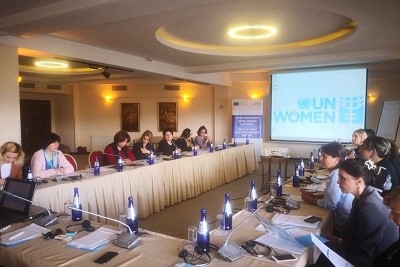Government to Improve Access to State Shelters for the Victims of Violence against Women
Date:
The legal requirement to obtain victims’ status in order to access state shelters has been continuously identified as a major impediment to effective service provision to victims/survivors of violence against women in Georgia.

With the support of the UN Women and the European Union, the government is set out to lift legal procedures for status determination enabling victims/survivors to access state shelters via standardized risk assessment checklist. On October 12-13, 2019 UN Women in partnership with the State Fund for Protection and Assistance of (Statutory) Victims of Human Trafficking conducted a two-day workshop launching the new risk assessment questionnaire. The questionnaire has been developed in line with the internationally established methodologies and best practices and will enable state services to assess eligibility of victims/survivors for accessing state shelters, bypassing legal and bureaucratic procedures. The workshop aims at validating the questionnaire with practitioners in the field and developing capacity of shelters/crisis centers staff on utilizing the new tool.
In addition to the technical assistance provided to the government of Georgia in developing the risk assessment questionnaire, UN Women has further provided support to the government in introducing legal amendments which will lift victims’ status as a requisite for accessing shelters. The legislative amendments are expected to be introduced by the Parliament of Georgia by the end of 2019.
According to the Georgian VAW/DV law, to become eligible for accessing state-run shelters a victim/survivor must obtain a legal victim’s status first. There are several modalities for obtaining the victims’ status such as issuing a restrictive/protective order by police and court respectively and/or, being recognized a victim in criminal proceedings, receiving status from the special status granting group established under the Inter-Agency Commission on Gender Equality, Violence against Women and Domestic Violence. All these options entail substantial bureaucratic procedures, which obstruct victims/survivors from effectively accessing services contrary to the requirements under the article 23 of the Istanbul Convention (Shelters), as well as the CEDAW General recommendation No. 35.
The procedures described above have been further identified as a barrier by the Special Rapporteur on violence against women, its causes and consequences Dr. Dubravka Simonovic who has recommended lifting the victims’ status as a requisite for accessing shelters in her report on her visit to Georgia in 2016.